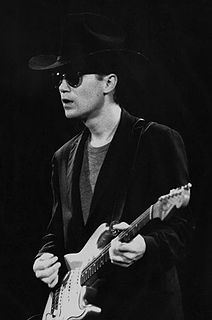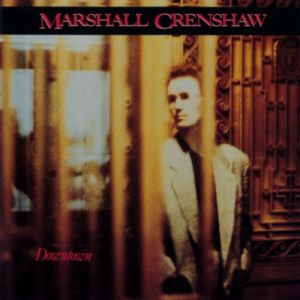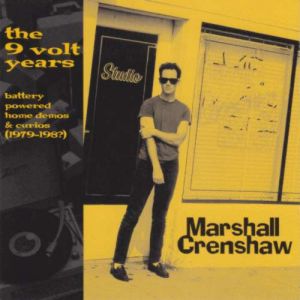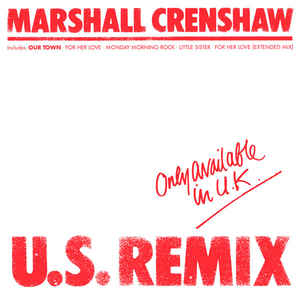
Marshall Howard Crenshaw is an American musician, singer, songwriter, and guitarist best known for hit songs such as "Someday, Someway," a US top 40 hit in 1982, "Cynical Girl," and "Whenever You're on My Mind." He is also the co-author of one of the biggest radio hits of the ‘90s, the Gin Blossoms, "Til I Hear It from You." His music has roots in classic soul music and Buddy Holly, to whom Crenshaw was often compared in the early days of his career, and whom he portrayed in the 1987 film La Bamba.
Don Dixon is an American record producer, songwriter, and musician. He is considered to be one of the key producers of what is called the jangle pop movement of the early 1980s, including working with R.E.M. and The Smithereens.

Joseph Leonard Bonamassa is an American blues rock guitarist, singer and songwriter. He started his career at age twelve, when he opened for B.B. King. Since 2000, Bonamassa has released fifteen solo albums through his independent record label J&R Adventures, of which eleven have reached No. 1 on the Billboard Blues chart.

Syd Straw is an American rock singer and songwriter. The daughter of actor Jack Straw, she began her career singing backup for Pat Benatar, then took her distinct voice to the indie/alternative scene and joined the ever-evolving line-up of Golden Palominos from 1985 through 1987, appearing on their second and third albums. Straw was a frequent lead singer and occasional co-songwriter for the group, which was spearheaded by drummer Anton Fier and also featured vocal turns by Michael Stipe, Matthew Sweet, Don Dixon, Jack Bruce and others. She left the group in 1987 to establish her solo career.

"Rock Me Baby" is a blues standard that has become one of the most recorded blues songs of all time. It originated as "Rockin' and Rollin'", a 1951 song by Lil' Son Jackson, itself inspired by earlier blues. Renditions by Muddy Waters and B.B. King made the song well-known. When B.B. King's recording of "Rock Me Baby" was released in 1964, it became his first single to reach the Top 40 in Billboard magazine's Hot 100 chart.
"Come On" is a song written by New Orleans rhythm and blues artist Earl King. He first recorded the song as "Darling Honey Angel Child" in 1960 for the Ace Records subsidiary Rex. Later that year, he recorded it as a two-part song for Imperial Records using some new lyrics. Retitled "Come On", it was released in 1960 with "Come On – Part I” as the A-side backed with “Come On – Part II”.

"Crying, Waiting, Hoping" is a song written by Buddy Holly. It was released in 1959 as the B-side to "Peggy Sue Got Married". Three versions of Holly's recording were released: the 1959 commercial release, the 1964 reissue with different orchestration, and Holly's original, private home recording.

"You're My Favorite Waste of Time" is a song written and first released by American singer Marshall Crenshaw. His 1979 home demo of the song was released as the B-side of his 1982 hit "Someday, Someway" and is available on his compilations The 9 Volt Years and This Is Easy: The Best of Marshall Crenshaw.
"Big Ten Inch Record", also known as "Big Ten-Inch ", is a rhythm and blues song written by Fred Weismantel. It was first recorded in 1952 by Bull Moose Jackson and released by King Records. The song was later covered by Aerosmith and released as part of the 1975 album, Toys in the Attic. It has been rated as one of the best double entendre songs of all time.

"3 O'Clock Blues" or "Three O'Clock Blues" is a slow twelve-bar blues recorded by Lowell Fulson in 1946. When it was released in 1948, it became Fulson's first hit. When B.B. King recorded the song in 1951, it became his first hit as well as one of the best-selling R&B singles in 1952.

Downtown is the third album by singer/songwriter Marshall Crenshaw. Recorded after the relative failure of his album Field Day, Downtown was a departure from his previous albums due to its more rootsy sound.

Mary Jean & 9 Others is the fourth album by singer-songwriter Marshall Crenshaw. The album was produced by Don Dixon and features a return to the sounds of Crenshaw's earlier work after the country rock excursion of his previous album, Downtown.

The 9 Volt Years is a compilation of early recordings by Marshall Crenshaw. It includes first versions of Crenshaw's best known songs, including "Someday, Someway" and "You're My Favorite Waste Of Time".

This Is Easy: The Best of Marshall Crenshaw is a greatest hits album by singer-songwriter Marshall Crenshaw. It was released in 2000 on Rhino Records.

"Whenever You're on My Mind" is a 1983 song by American rock musician Marshall Crenshaw. The song was released on his 1983 album Field Day. The song, notable for its booming production, originally was written during the making of Crenshaw's debut album but was saved for his second album release. Crenshaw felt the song was his best to date, and the song was released as Field Day's first single.

Blues Is King is a live album by blues musician, B.B. King. It was recorded in Chicago in 1966 and released by the BluesWay label in 1967.

"Cynical Girl" is a 1982 song by American rock musician Marshall Crenshaw. The song was released on his 1982 debut album, Marshall Crenshaw. Written as a satire on the "mass culture" that Crenshaw disliked, the song was not based on a specific girl.

"Our Town" is a 1983 song by American rock musician Marshall Crenshaw. The song was released on his 1983 album Field Day. Written as an ode to Crenshaw's hometown at the time, New York City, the song features a melody inspired by Babs Cooper's version of "Honest I Do," a record that Crenshaw had heard in his childhood.
"Mary Anne" is a 1982 song by American rock musician Marshall Crenshaw. The song was released on his 1982 debut album, Marshall Crenshaw. Written from the perspective of trying to console someone, the song's title was not based on a specific girl. The song's hook was described by Crenshaw as going for a "hypnotic" effect and the song features layered 12-string guitar parts.
"Keep On Churnin' " is a rhythm and blues song written by Henry Glover, Jester Hairston, and Lois Mann. It was first recorded in 1952 by Wynonie Harris, with backing from the Todd Rhodes Orchestra, and released by King Records. The song was also recorded by Hank Ballard and the Midnighters. It has been rated as one of the best double entendre songs of all time.















